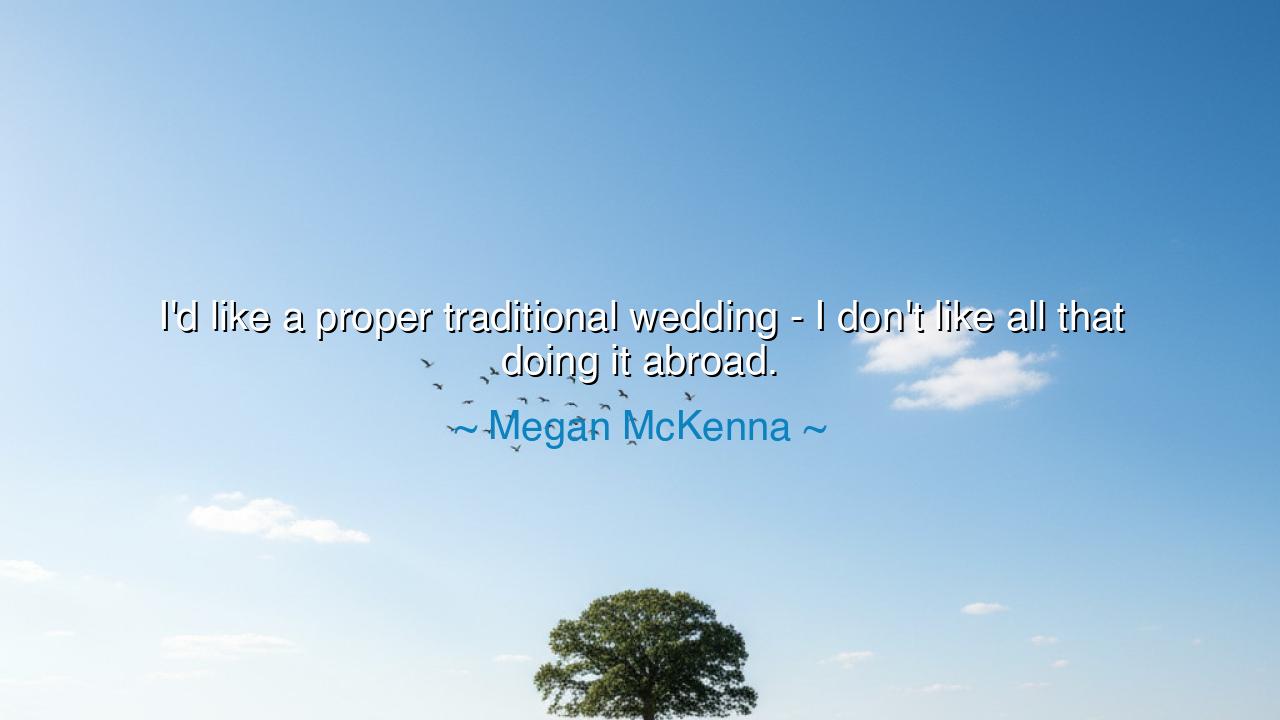
I'd like a proper traditional wedding - I don't like all that






Hearken, O seekers of ritual and remembrance, to the words of Megan McKenna, who speaks with the voice of one drawn to the roots of tradition. She longs for a proper, traditional wedding, shunning the allure of distant lands and foreign grandeur. In this preference lies a timeless teaching: that the essence of a rite of passage is not found in exotic locales or fleeting novelty, but in the depth of heritage, the continuity of practices passed from one generation to the next.
This utterance reminds us that place and context carry meaning. To marry amidst the soil and halls familiar to one’s ancestors is to honor the lineage from which one springs. Across the ages, mortals have gathered in the spaces sanctified by their forebears—the temples, halls, and hearths of home—so that each union resonates with the wisdom and blessings of those who came before. In doing so, the simple act of ceremony becomes a bridge between the past and the present.
Consider the story of Queen Victoria, whose insistence on traditional British weddings for her children reinforced not merely etiquette, but the enduring cultural values of a nation. Her ceremonies, rooted in heritage and the familiar customs of the court, bound families and subjects alike in the shared reverence for ancestral rites. Megan McKenna’s words echo this same instinct: to cherish ritual as a vessel of continuity and honor.
Yet beyond heritage lies the lesson of authenticity. A wedding abroad, dazzling though it may be, cannot imbue the ceremony with the same resonance as one intertwined with home, community, and familial memory. True celebration arises not from distance or spectacle, but from the heartfelt participation of those who witness and bless the union, weaving the present into the tapestry of generations.
Let all who reflect on these words understand the enduring value of tradition: it anchors us, provides stability, and honors the invisible hands of ancestors who shaped our existence. In choosing the familiar over the foreign, one embraces the ritual’s power to transform mere events into sacred passage, and fleeting joy into enduring legacy.
Thus, O children of remembrance, mark this counsel and carry it in your hearts: seek not novelty for its own sake, but the profound meaning of continuity. In a proper, traditional wedding, the soul finds its place within the lineage of humanity, and the echoes of the past bless the journey into shared life.






TTNguyen Thi Thuy
I can totally relate to Megan’s thoughts about having a traditional wedding. The idea of getting married in your hometown, with everyone you love around you, feels so special. But why do you think destination weddings have become such a trend? Is it the allure of beautiful locations, or do couples see it as an opportunity to have a more intimate celebration with fewer guests?
NTNi Tran
It’s interesting to hear Megan talk about her desire for a traditional wedding, as so many people these days are turning to destination weddings for the experience. I wonder what it is about traditional weddings that makes them so appealing to some. Is it the familiarity and comfort they provide, or is it a deeper connection to family and heritage that makes a local wedding feel more meaningful?
NNBa Nam Nguyen
Megan’s preference for a traditional wedding speaks to the deep emotional connection many people have with cultural or familial traditions. However, the rise in destination weddings is a growing trend—do you think that trend is mainly about convenience or is it more about wanting something unique and memorable? How do you feel about having a wedding far from home versus celebrating close to family and friends?
TMtra my
I can completely understand Megan’s choice to go for a traditional wedding. There’s a lot of charm and warmth in having a wedding close to home, surrounded by family and friends. But do you think traditional weddings are starting to feel a bit outdated in today’s fast-paced world? Is there a way to mix tradition with a modern twist, so that it feels both timeless and relevant?
VKLai Nguyen Van Khanh
Megan’s preference for a traditional wedding really resonates with me. There’s something timeless and meaningful about a classic ceremony, especially when it’s rooted in culture and family. But I wonder—why do so many people opt for destination weddings these days? Is it because of the romanticized idea of getting married abroad, or is it the simplicity and convenience of a smaller, more intimate affair?